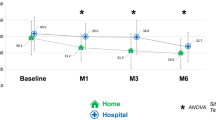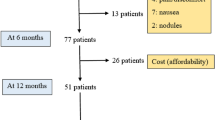Abstract.
The aim of this study was to asses whether patients with Parkinson’s disease (PD) develop cognitive and psychiatric complications more frequently during prolonged therapy with continuous apomorphine infusion compared with standard oral treatment. Thirty consecutive PD patients with severe motor fluctuations were included in the study. Twelve patients accepted the treatment with subcutaneous continuous apomorphine infusion, while the remaining 18 preferred to continue with oral dopaminergic therapy. The two groups were evaluated with neuropsychological, psychiatric, and motor tests at baseline and after 1 year. The off daily duration and the levodopa dosage were significantly reduced in infused patients. The neuropsychiatric assessment did not change in both groups compared with baseline, except for a significant improvement of mood in the apomorphine group.
Similar content being viewed by others
Author information
Authors and Affiliations
Rights and permissions
About this article
Cite this article
Di Rosa, A.E., Epifanio, A., Antonini, A. et al. Continuous apomorphine infusion and neuropsychiatric disorders: a controlled study in patients with advanced Parkinson’s disease. Neurol Sci 24, 174–175 (2003). https://doi.org/10.1007/s10072-003-0116-0
Issue Date:
DOI: https://doi.org/10.1007/s10072-003-0116-0




